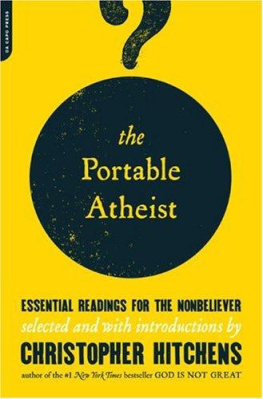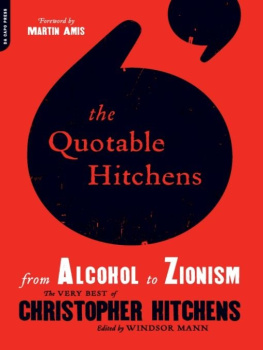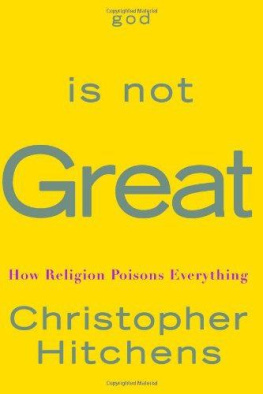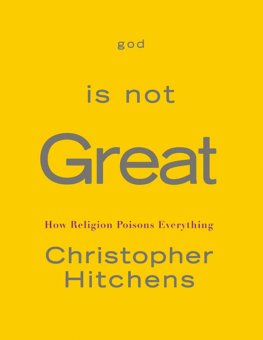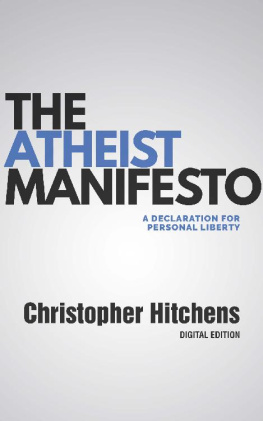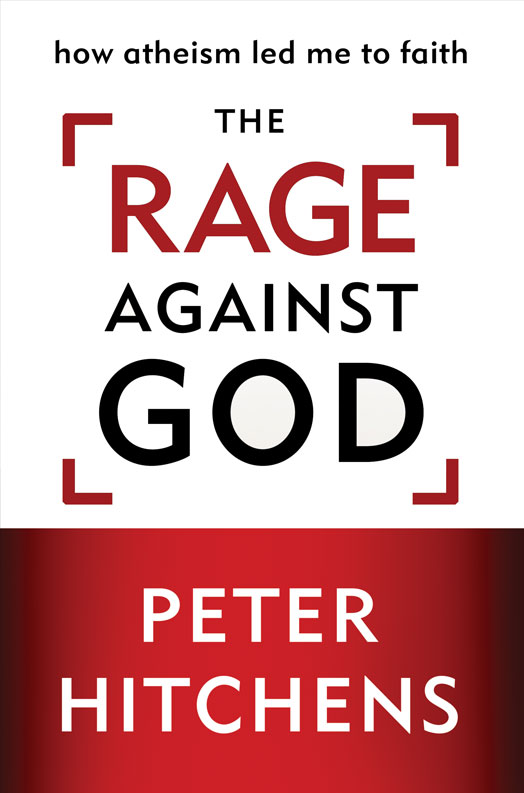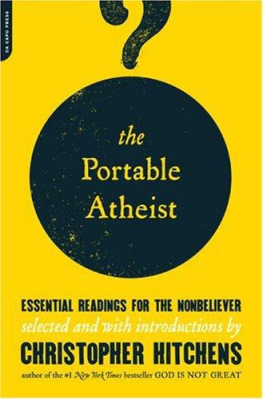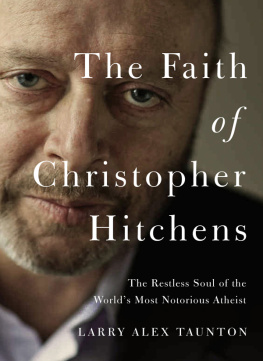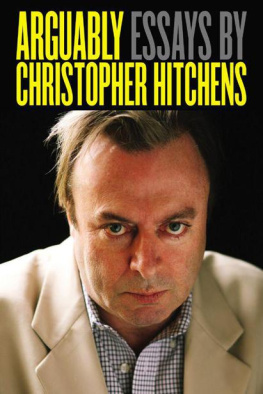the Portable Atheist
ESSENTIAL READINGS FOR THE NONBELIEVER
selected and with introductions by
CHRISTOPHER HITCHENS

DA CAPO PRESS
A Member of the Perseus Books Group
List of credits/permissions can be found on back matter.
Every effort has been made to contact or trace all copyright holders. The publisher will be glad to make good any errors or omissions brought to our attention in future additions.
Introductions copyright 2007 by Christopher Hitchens
Published in the United States by Da Capo Press, a member of the Perseus Books Group, http://www.dacapopress.com.
All rights reserved. No part of this publication may be reproduced, stored in a retrieval system, or transmitted, in any form or by any means, electronic, mechanical, photocopying, recording, or otherwise, without the prior written permission of the publisher. Printed in the United States of America.
Cataloging-in-Publication data for this book is available from the Library of Congress
ISBN: 978-0-306-81608-6
Dedicated to the memory of Primo Levi (19191987) who had the moral fortitude to refuse false consolation even while enduring the selection process in Auschwitz:
Silence slowly prevails and then, from my bunk on the top row, I see and hear old Kuhn praying aloud, with his beret on his head, swaying backwards and forwards violently. Kuhn is thanking God because he has not been chosen.
Kuhn is out of his senses. Does he not see Beppo the Greek in the bunk next to him, Beppo who is twenty years old and is going to the gas-chamber the day after tomorrow and knows it and lies there looking fixedly at the light without saying anything and without even thinking anymore? Can Kuhn fail to realize that next time it will be his turn? Does Kuhn not understand that what has happened today is an abomination, which no propitiatory prayer, no pardon, no expiation by the guilty, which nothing at all in the power of man can ever clean again?
If I was God, I would spit at Kuhns prayer.
F ROM P RIMO L EVI : I F T HIS I S A M AN (1959)
I too entered the Lager as a nonbeliever, and as a nonbeliever I was liberated and have lived to this day. Actually, the experience of the Lager with its frightful iniquity confirmed me in my nonbelief. It has prevented me, and still prevents me, from conceiving of any form of providence or transcendent justiceI must nevertheless admit that I experienced (and again only once) the temptation to yield, to seek refuge in prayer. This happened in October 1944, in the one moment in which I lucidly perceived the imminence of deathnaked and compressed among my naked companions with my personal index card in hand, I was waiting to file past the commission that with one glance would decide whether I should go immediately into the gas chamber or was instead strong enough to go on working. For one instance I felt the need to ask for help and asylum; then, despite my anguish, equanimity prevailed: one does not change the rules of the game at the end of the match, nor when you are losing. A prayer under these conditions would have been not only absurd (what rights could I claim? and from whom?) but blasphemous, obscene, laden with the greatest impiety of which a nonbeliever is capable. I rejected the temptation: I knew that otherwise were I to survive, I would have to be ashamed of it.
F ROM P RIMO L EVI : T HE D ROWNED AND THE S AVED (1986)
Acknowledgments
My warmest thanks are due to my agent, Steve Wasserman, and my publisher and editor, Ben Schafer, for the collaboration which initiated this volume. I s safe to say that without the devoted skill of Lori Hobkirk as copy editor and project editor and Cliff Corcoran as copyright and permissions editor, the scope and range of the collection would have been considerably less than it is.
When accusedprobably correctlyof scientific plagiarism, Sir Isaac Newton was careful to say (again plagiarizing from an ancient acknowledgement) that he had stood on the shoulders of giants. I am, in this effort as in all my other ones, immensely indebted to a small but growing group of devoted rationalists, who reject the absurd and wicked claims of the religious and who look for answers in the marvels and complexities of science, as well as in the higher and deeper reaches of literature. I am more proud than I can say that Salman Rushdie, Ian McEwan, and Ayaan Hirsi Ali contributed some hitherto unpublished work to this anthology. In the realm of the natural and physical sciences, the labors of Richard Dawkins, Daniel Dennett, Michael Shermer, Steven Weinberg, Anthony Grayling, and Sam Harris have been at once courageous, witty, and original, and it is my dearest hope that anybody picking up this book of excerpts will be impelled to read all these distinguished authors at their full length and full strength.
Christopher Hitchens
Introduction
Christopher Hitchens
At the close of his imperishable novel La Peste (The Plague), Albert Camus gives us a picture of the thoughts of the good Dr. Rieux, as the town of Oran celebrates its recovery fromits survival ofa terrible visitation of disease. Rieux determines to remain lucid and to complete this chronicle, in order that:
He should not be one of those who held their peace but should bear witness in favor of those plague-stricken people; so that some memorial of the injustice and outrage done them might endure; and to state quite simply what we learn in a time of pestilence: that there are more things to admire in men than to despise.
This is part of the work, both of conscience and of memory. The pre-history of our species is hag-ridden with episodes of nightmarish ignorance and calamity, for which religion used to identify, not just the wrong explanation but the wrong culprit. Human sacrifices were made preeminently in times of epidemics, useless prayers were uttered, bogus miracles attested to, and scapegoatssuch as Jews or heretics or witcheshunted down and burned. The few men of science and reason and medicine had all they could do to keep their libraries and laboratories intact, or their very lives safe from harm. Of course, when the evil had passed over, there were equally idiotic ceremonies of hysterical thanksgiving, propitiating whatever local deities there might be

